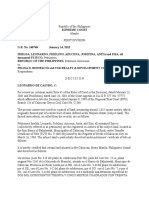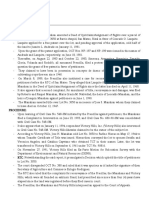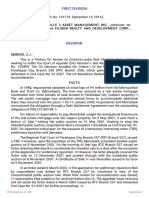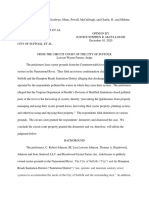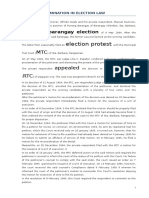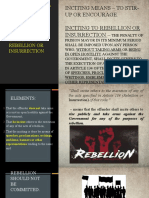Eland Vs Garcia
Eland Vs Garcia
Uploaded by
SachuzenCopyright:
Available Formats
Eland Vs Garcia
Eland Vs Garcia
Uploaded by
SachuzenOriginal Description:
Original Title
Copyright
Available Formats
Share this document
Did you find this document useful?
Is this content inappropriate?
Copyright:
Available Formats
Eland Vs Garcia
Eland Vs Garcia
Uploaded by
SachuzenCopyright:
Available Formats
G.R. No.
173289, February
17, 2010
ELAND
PHILIPPINES,
INC.,
PETITIONER,
VS.
AZUCENA
GARCIA, ELINO FAJARDO, AND
HEIR OF TIBURCIO MALABANAN
NAMED TERESA MALABANAN,
RESPONDENTS.
Facts:
Respondents Azucena Garcia, Elino Fajardo,
and Teresa Malabanan, the heir of Tiburcio
Malabanan, filed a Complaint dated March 2,
1998 for Quieting of Title with Writ of
Preliminary Injunction with the RTC, Branch
XVIII, Tagaytay City against petitioner Eland
Philippines, Inc. Respondents claimed that
they are the owners, in fee simple title, of a
parcel of land identified as Lot 9250 Cad-355,
Tagaytay Cadastre, Plan Ap-04-008367,
situated in Barangay Iruhin, Tagaytay City,
containing an area of Two Hundred Forty-
Four Thousand One Hundred Twelve
(244,112) square meters, by occupation and
possession under the provisions of Sec. 48 (b)
of the Public Land Law or Commonwealth Act
No. 141, as amended.
For having been in continuous, public, and
adverse possession as owners of the said lot
for at least thirty years, respondents stated
that they were not aware of any person or
entity who had a legal or equitable interest or
claim on the same lot until the time they
were requesting that the lot be declared for
tax purposes. They found out that the lot was
the subject of a land registration proceeding
that had already been decided by the same
court where their complaint was filed. They
also found out that Decree No. N-217313,
LRC Record No. N-62686, was already issued
on August 20, 1997 to the petitioner pursuant
to the Decision dated June 7, 1994 of the
same court. They averred that they were not
notified of the said land registration case;
thus, they claimed the presence of
misrepresentation amounting to actual or
extrinsic fraud. Thus, they argued that they
were also entitled to a writ of preliminary
injunction in order to restrain or enjoin
petitioner, its privies, agents, representatives,
and all other persons acting on its behalf, to
refrain from committing acts of dispossession
on the subject lot.
Issue:
WON quieting of title is
proper remedy in this case.
the
Ruling:
This Court deems it necessary to delve briefly
on the nature of the action of quieting of title
as applied in this case. This Court's ruling in
Calacala, et al. v. Republic, et al. is
instructive on this matter, thus:
To begin with, it bears emphasis that an
action for quieting of title is essentially a
common law remedy grounded on equity. As
we held in Baricuatro, Jr. vs. CA:
Regarding the nature of the action filed
before the trial court, quieting of title is a
common law remedy for the removal of any
cloud upon or doubt or uncertainty with
respect to title to real property. Originating in
equity jurisprudence, its purpose is to secure
`x x x an adjudication that a claim of title to
or an interest in property, adverse to that of
the complainant, is invalid, so that the
complainant and those claiming under him
may be forever afterward free from any
danger of hostile claim.' In an action for
quieting of title, the competent court is
tasked to determine the respective rights of
the complainant and other claimants, `x x x
not only to place things in their proper place,
to make the one who has no rights to said
immovable respect and not disturb the other,
but also for the benefit of both, so that he
who has the right would see every cloud of
doubt over the property dissipated, and he
could afterwards without fear introduce the
improvements he may desire, to use, and
even to abuse the property as he deems best
xxx.
Under Article 476 of the New Civil Code, the
remedy may be availed of only when, by
reason of any instrument, record, claim,
encumbrance or proceeding, which appears
valid but is, in fact, invalid, ineffective,
voidable, or unenforceable, a cloud is thereby
cast on the complainant's title to real
property or any interest therein. The codal
provision reads:
Article 476. Whenever there is a cloud on
title to real property or any interest therein,
by reason of any instrument, record, claim,
encumbrance or proceeding which is
apparently valid or effective but is in truth
and in fact invalid, ineffective, voidable, or
unenforceable, and may be prejudicial to said
title, an action may be brought to remove
such cloud or to quiet the title.
It can thus be seen that for an action for
quieting of title to prosper, the plaintiff must
first have a legal, or, at least, an equitable
title on the real property subject of the action
and that the alleged cloud on his title must be
shown to be in fact invalid. So it is that in
Robles, et al. vs. CA, we ruled:
It is essential for the plaintiff or complainant
to have a legal title or an equitable title to or
interest in the real property which is the
subject matter of the action. Also, the deed,
claim, encumbrance or proceeding that is
being alleged as a cloud on plaintiff's title
must be shown to be in fact invalid or
inoperative
despite
its
prima
facie
appearance of validity or legal efficacy.
Verily, for an action to quiet title to prosper,
two (2) indispensable requisites must concur,
namely: (1) the plaintiff or complainant
has a legal or an equitable title to or
interest in the real property subject of
the action; and (2) the deed, claim,
encumbrance, or proceeding claimed to
be casting cloud on his title must be
shown to be in fact invalid or inoperative
despite its prima facie appearance of
validity or legal efficacy.
Respondents, in their Complaint, claim that
they have become the owners in fee- simple
title of the subject land by occupation and
possession under the provisions of Sec. 48 (b)
of the Public Land Law or Commonwealth Act
No. 141, as amended. Thus, it appears that
the first requisite has been satisfied. Anent
the
second
requisite,
respondents
enumerated several facts that would tend to
prove the invalidity of the claim of the
petitioner. All of these claims, which would
correspond to the two requisites for the
quieting of title, are factual; and, as
discussed earlier, the petitioner interposed its
objections and duly disputed the said claims,
thus, presenting genuine issues that can only
be resolved through a full- blown trial.
Anent the propriety of the filing of an action
for the quieting of title, the indefeasibility
and incontrovertibility of the decree of
registration come into question. Under Sec.
32 of P.D. No. 1529 or the Property
Registration Decree:
Section 32. Review of decree of registration;
Innocent purchaser for value. The decree of
registration shall not be reopened or revised
by reason of absence, minority, or other
disability of any person adversely affected
thereby, nor by any proceeding in any court
for reversing judgments, subject, however, to
the right of any person, including the
government and the branches thereof,
deprived of land or of any estate or interest
therein by such adjudication or confirmation
of title obtained by actual fraud, to file in the
proper Court of First Instance a petition for
reopening and review of the decree of
registration not later than one year from and
after the date of the entry of such decree of
registration, but in no case shall such petition
be entertained by the court where an
innocent purchaser for value has acquired
the land or an interest therein, whose rights
may be prejudiced. Whenever the phrase
"innocent purchaser for value" or an
equivalent phrase occurs in this Decree, it
shall be deemed to include an innocent
lessee, mortgagee, or other encumbrancer
for value.
Upon the expiration of said period of one
year, the decree of registration and the
certificate of title issued shall become
incontrovertible. Any person aggrieved by
such decree of registration in any case may
pursue his remedy by action for damages
against the applicant or any other persons
responsible for the fraud.
As borne out by the records and undisputed
by the parties, OCT No. 0-660 of petitioner
was issued on August 29, 1997 pursuant to a
Decree issued on August 20, 1997, while the
complaint for the quieting of title in Civil
Case No. TG-1784 was filed and docketed on
March 5, 1998; hence, applying the above
provisions, it would seem that the period of
one (1) year from the issuance of the decree
of registration has not elapsed for the review
thereof. However, a closer examination of
the above provisions would clearly
indicate that the action filed, which was
for quieting of title, was not the proper
remedy.
Courts may reopen proceedings already
closed by final decision or decree when an
application for review is filed by the party
aggrieved within one year from the issuance
of the decree of registration. However, the
basis of the aggrieved party must be
anchored solely on actual fraud. Shedding
light on the matter is a discussion presented
in one of the recognized textbooks on
property registration, citing decisions of this
Court, thus:
The right of a person deprived of land or of
any estate or interest therein by adjudication
or confirmation of title obtained by actual
fraud is recognized by law as a valid and
legal basis for reopening and revising a
decree of registration. One of the remedies
available to him is a petition for review.
To avail of a petition for review, the following
requisites must be satisfied:
(a) The petitioner must have an estate or
interest in the land;(b) He must show actual
fraud in the procurement of the decree of
registration;(c) The petition must be filed
within one year from the issuance of the
decree by the Land Registration Authority;
and(d) The property has not yet passed to an
innocent purchaser for value.
As further pointed out in the same book the
petition for review must be filed within one
year from entry of the decree of registration.
As written:
As long as a final decree has not been
entered by the Land Registration Authority
and period of one year has not elapsed from
the date of entry of such decree, the title is
not finally adjudicated and the decision in the
registration case continues to be under the
control and sound discretion of the
registration court. After the lapse of said
period, the decree becomes incontrovertible
and no longer subject to reopening or review.
Section 32 provides that a petition for
review of the decree of registration may
be filed "not later than one year from and
after the date of entry of such decree of
registration." Giving this provision a literal
interpretation, it may at first blush seem that
the petition for review cannot be presented
until the final decree has been entered.
However, it has been ruled that the petition
may be filed at any time after the
rendition of the court's decision and
before the expiration of one year from
the entry of the final decree of
registration for, as noted in Rivera v. Moran,
there can be no possible reason requiring the
complaining party to wait until the final
decree is entered before urging his claim for
fraud.
The one-year period stated in Sec. 32 within
which a petition to re-open and review the
decree of registration refers to the decree of
registration described in Section 31, which
decree is prepared and issued by the Land
Registration Administrator.
The provision of Section 31 that every decree
of registration shall bind the land, quiet title
thereto, and be conclusive upon and against
all
persons,
including
the
national
government, and Sec. 32 that the decree
shall not be reopened or revised by reason of
absence, minority or other disability or by
any proceeding in court, save only in cases of
actual fraud and then only for one year from
the entry of the decree, must be understood
as referring to final and unappealable
decrees of registration. A decision or, as it is
sometimes called after entry, a decree of a
registration court, does not become final and
unappealable until fifteen days after the
interested parties have been notified of its
entry, and during that period may be set
aside by the trial judge on motion for new
trial, upon any of the grounds stated in the
Rules of Court. An appeal from the decision
of the trial court prevents the judgment from
becoming final until that decree is affirmed
by the judgment of the appellate court.
A petition for review under Section 32 is
a remedy separate and distinct from a
motion for new trial and the right to the
remedy is not affected by the denial of
such a motion irrespective of the
grounds upon which it may have been
presented. Thus, where petitioners acquired
their interest in the land before any final
decree had been entered, the litigation was
therefore in effect still pending and, in these
circumstances, they can hardly be considered
innocent purchasers in good faith.
Where the petition for review of a decree of
registration is filed within the one-year
period from entry of the decree, it is error for
the court to deny the petition without hearing
the evidence in support of the allegation of
actual and extrinsic fraud upon which the
petition is predicated. The petitioner should
be afforded an opportunity to prove such
allegation.
In the present case, the one-year period
before the Torrens title becomes indefeasible
and incontrovertible has not yet expired;
thus, a review of the decree of registration
would have been the appropriate remedy.
Based on the above disquisitions, the other
issues raised by the petitioner are necessarily
rendered inconsequential.
You might also like
- Affidavit of Undertaking: Operational Guidelines On The Progressive Expansion of Face-to-Face Learning ModalityNo ratings yetAffidavit of Undertaking: Operational Guidelines On The Progressive Expansion of Face-to-Face Learning Modality3 pages
- Death of A Party When An Action Survives.No ratings yetDeath of A Party When An Action Survives.8 pages
- Republic Vs Abrille GR No. L-39248 May 7, 1976: FactsNo ratings yetRepublic Vs Abrille GR No. L-39248 May 7, 1976: Facts3 pages
- Digest Sarmiento V Agana Case Digest PDF FreeNo ratings yetDigest Sarmiento V Agana Case Digest PDF Free2 pages
- Ramos vs. Sarao 451 SCRA 103 GR 149756 Feb 11 2005No ratings yetRamos vs. Sarao 451 SCRA 103 GR 149756 Feb 11 20058 pages
- Syjuco vs. Bonifacio - G.R. No. 148748 - January 14, 2015No ratings yetSyjuco vs. Bonifacio - G.R. No. 148748 - January 14, 201527 pages
- Citystate Savings Bank v. Teresita Tobias GR No. 22790 Reyes, JR., JNo ratings yetCitystate Savings Bank v. Teresita Tobias GR No. 22790 Reyes, JR., J7 pages
- Home Bankers Savings vs. CA, Et. Al. DigestNo ratings yetHome Bankers Savings vs. CA, Et. Al. Digest4 pages
- An Act Authorizing The Issuance of Free Patents To Residental LandsNo ratings yetAn Act Authorizing The Issuance of Free Patents To Residental Lands9 pages
- Commonwealth Insurance Corporation vs. Ca: Insurance Company, Inc. We Have Sustained TheNo ratings yetCommonwealth Insurance Corporation vs. Ca: Insurance Company, Inc. We Have Sustained The6 pages
- Petitioners vs. vs. Respondent Menandro Quiogue Jose Ma. Recto Paterno R. CanlasNo ratings yetPetitioners vs. vs. Respondent Menandro Quiogue Jose Ma. Recto Paterno R. Canlas5 pages
- 228-South Pachem Development Inc VS Ca PDFNo ratings yet228-South Pachem Development Inc VS Ca PDF2 pages
- Petitioner Vs Vs Respondent: Third DivisionNo ratings yetPetitioner Vs Vs Respondent: Third Division8 pages
- Purita Alipio, Petitioner, vs. Court of Appeals and Romeo G. Jaring, Represented by His Attorney-In-Fact RAMON G. JARING, RespondentsNo ratings yetPurita Alipio, Petitioner, vs. Court of Appeals and Romeo G. Jaring, Represented by His Attorney-In-Fact RAMON G. JARING, Respondents6 pages
- JH Ankron Vs Government of The Phil Islands CASE DIGESTs0% (1)JH Ankron Vs Government of The Phil Islands CASE DIGESTs2 pages
- Camitan vs. Fidelity Investment Corporation PDFNo ratings yetCamitan vs. Fidelity Investment Corporation PDF15 pages
- Almendra v. Intermediatte Appellate Court (Digest)No ratings yetAlmendra v. Intermediatte Appellate Court (Digest)2 pages
- Cameron Granville 3 Asset Management, Inc. v. ChuaNo ratings yetCameron Granville 3 Asset Management, Inc. v. Chua7 pages
- Angat v. Republic, GR 175788, June 30, 2009, 591 SCRA 364No ratings yetAngat v. Republic, GR 175788, June 30, 2009, 591 SCRA 3641 page
- Jurisprudence On Quieting of Title and Reconveyance100% (1)Jurisprudence On Quieting of Title and Reconveyance7 pages
- Calacala - v. - Republic20180404-1159-Aptajq PDFNo ratings yetCalacala - v. - Republic20180404-1159-Aptajq PDF8 pages
- Patent Laws of the Republic of Hawaii and Rules of Practice in the Patent OfficeFrom EverandPatent Laws of the Republic of Hawaii and Rules of Practice in the Patent OfficeNo ratings yet
- NORA B. CALALANG-PARULAN AND ELVIRA B. CALALANG Vs - ROSARIO CALALANG - GARCIANo ratings yetNORA B. CALALANG-PARULAN AND ELVIRA B. CALALANG Vs - ROSARIO CALALANG - GARCIA3 pages
- Dangwa Transportation Vs Court of AppealsNo ratings yetDangwa Transportation Vs Court of Appeals10 pages
- Republic of The Philippines, Petitioner, vs. Hon. Court of Appeals and Isabel Lastimado, RespondentsNo ratings yetRepublic of The Philippines, Petitioner, vs. Hon. Court of Appeals and Isabel Lastimado, Respondents6 pages
- Laguna Lake Development Authority Vs CA, Serapio, AsistioNo ratings yetLaguna Lake Development Authority Vs CA, Serapio, Asistio7 pages
- Supreme Court of India Constitution Day Celebrations 26 NOVEMBER 2016No ratings yetSupreme Court of India Constitution Day Celebrations 26 NOVEMBER 201624 pages
- Kevin Rutherford v. Gary Neet, Attorney General For The State of Colorado, District Court, Court of Appeals, and State Supreme Court, 149 F.3d 1191, 10th Cir. (1998)No ratings yetKevin Rutherford v. Gary Neet, Attorney General For The State of Colorado, District Court, Court of Appeals, and State Supreme Court, 149 F.3d 1191, 10th Cir. (1998)3 pages
- G.R. No. 229701 EDWINA RIMANDO FERNANDO Vs PEOPLENo ratings yetG.R. No. 229701 EDWINA RIMANDO FERNANDO Vs PEOPLE13 pages
- Cincinnati Soap Co. v. United States, 301 U.S. 308 (1937)No ratings yetCincinnati Soap Co. v. United States, 301 U.S. 308 (1937)10 pages
- United States v. David Thai, Lan Ngoc Tran, Minh Do, Jimmy Nguyen, Hoang Huy Ngo, Quang Van Nguyen, and LV Hong, A/K/A "L.v. Hong", 29 F.3d 785, 2d Cir. (1994)No ratings yetUnited States v. David Thai, Lan Ngoc Tran, Minh Do, Jimmy Nguyen, Hoang Huy Ngo, Quang Van Nguyen, and LV Hong, A/K/A "L.v. Hong", 29 F.3d 785, 2d Cir. (1994)45 pages
- Defiition, Nature, Scope and Object of TortNo ratings yetDefiition, Nature, Scope and Object of Tort4 pages
- UNITED STATES, Appellee v. Staff Sergeant Robert Bales U.S. Army, ApellantNo ratings yetUNITED STATES, Appellee v. Staff Sergeant Robert Bales U.S. Army, Apellant13 pages
- Government's Motion To Unseal Wiretap Contents and Related Documents100% (1)Government's Motion To Unseal Wiretap Contents and Related Documents2 pages
- 7-People of The Philippines vs. Sonny Gatarin y Caballero at - Jay-R - and Eduardo QuisayasNo ratings yet7-People of The Philippines vs. Sonny Gatarin y Caballero at - Jay-R - and Eduardo Quisayas19 pages
- Tax Mates - 2. Equal Protection of The Laws155643No ratings yetTax Mates - 2. Equal Protection of The Laws1556433 pages
- Johnson v. City of Suffolk, No. 191563 (Va. Dec. 10, 2020)No ratings yetJohnson v. City of Suffolk, No. 191563 (Va. Dec. 10, 2020)11 pages
- 2018 Bar Questions and Answers in Political LawNo ratings yet2018 Bar Questions and Answers in Political Law14 pages
- ACCFA V ACCFA Supervisors Association DigestNo ratings yetACCFA V ACCFA Supervisors Association Digest2 pages
- Dist.N.D.Ill. - 1-18-cv-07081 - 32 Jamisha Rosebar v. CSWS, LLC Et Al., ComplaintNo ratings yetDist.N.D.Ill. - 1-18-cv-07081 - 32 Jamisha Rosebar v. CSWS, LLC Et Al., Complaint30 pages
- Report - Art.138 - Inciting To RebellionNo ratings yetReport - Art.138 - Inciting To Rebellion6 pages
- Affidavit of Undertaking: Operational Guidelines On The Progressive Expansion of Face-to-Face Learning ModalityAffidavit of Undertaking: Operational Guidelines On The Progressive Expansion of Face-to-Face Learning Modality
- Republic Vs Abrille GR No. L-39248 May 7, 1976: FactsRepublic Vs Abrille GR No. L-39248 May 7, 1976: Facts
- Ramos vs. Sarao 451 SCRA 103 GR 149756 Feb 11 2005Ramos vs. Sarao 451 SCRA 103 GR 149756 Feb 11 2005
- Syjuco vs. Bonifacio - G.R. No. 148748 - January 14, 2015Syjuco vs. Bonifacio - G.R. No. 148748 - January 14, 2015
- Citystate Savings Bank v. Teresita Tobias GR No. 22790 Reyes, JR., JCitystate Savings Bank v. Teresita Tobias GR No. 22790 Reyes, JR., J
- An Act Authorizing The Issuance of Free Patents To Residental LandsAn Act Authorizing The Issuance of Free Patents To Residental Lands
- Commonwealth Insurance Corporation vs. Ca: Insurance Company, Inc. We Have Sustained TheCommonwealth Insurance Corporation vs. Ca: Insurance Company, Inc. We Have Sustained The
- Petitioners vs. vs. Respondent Menandro Quiogue Jose Ma. Recto Paterno R. CanlasPetitioners vs. vs. Respondent Menandro Quiogue Jose Ma. Recto Paterno R. Canlas
- Purita Alipio, Petitioner, vs. Court of Appeals and Romeo G. Jaring, Represented by His Attorney-In-Fact RAMON G. JARING, RespondentsPurita Alipio, Petitioner, vs. Court of Appeals and Romeo G. Jaring, Represented by His Attorney-In-Fact RAMON G. JARING, Respondents
- JH Ankron Vs Government of The Phil Islands CASE DIGESTsJH Ankron Vs Government of The Phil Islands CASE DIGESTs
- Almendra v. Intermediatte Appellate Court (Digest)Almendra v. Intermediatte Appellate Court (Digest)
- Cameron Granville 3 Asset Management, Inc. v. ChuaCameron Granville 3 Asset Management, Inc. v. Chua
- Angat v. Republic, GR 175788, June 30, 2009, 591 SCRA 364Angat v. Republic, GR 175788, June 30, 2009, 591 SCRA 364
- Jurisprudence On Quieting of Title and ReconveyanceJurisprudence On Quieting of Title and Reconveyance
- Patent Laws of the Republic of Hawaii and Rules of Practice in the Patent OfficeFrom EverandPatent Laws of the Republic of Hawaii and Rules of Practice in the Patent Office
- NORA B. CALALANG-PARULAN AND ELVIRA B. CALALANG Vs - ROSARIO CALALANG - GARCIANORA B. CALALANG-PARULAN AND ELVIRA B. CALALANG Vs - ROSARIO CALALANG - GARCIA
- Republic of The Philippines, Petitioner, vs. Hon. Court of Appeals and Isabel Lastimado, RespondentsRepublic of The Philippines, Petitioner, vs. Hon. Court of Appeals and Isabel Lastimado, Respondents
- Laguna Lake Development Authority Vs CA, Serapio, AsistioLaguna Lake Development Authority Vs CA, Serapio, Asistio
- Supreme Court of India Constitution Day Celebrations 26 NOVEMBER 2016Supreme Court of India Constitution Day Celebrations 26 NOVEMBER 2016
- Kevin Rutherford v. Gary Neet, Attorney General For The State of Colorado, District Court, Court of Appeals, and State Supreme Court, 149 F.3d 1191, 10th Cir. (1998)Kevin Rutherford v. Gary Neet, Attorney General For The State of Colorado, District Court, Court of Appeals, and State Supreme Court, 149 F.3d 1191, 10th Cir. (1998)
- Cincinnati Soap Co. v. United States, 301 U.S. 308 (1937)Cincinnati Soap Co. v. United States, 301 U.S. 308 (1937)
- United States v. David Thai, Lan Ngoc Tran, Minh Do, Jimmy Nguyen, Hoang Huy Ngo, Quang Van Nguyen, and LV Hong, A/K/A "L.v. Hong", 29 F.3d 785, 2d Cir. (1994)United States v. David Thai, Lan Ngoc Tran, Minh Do, Jimmy Nguyen, Hoang Huy Ngo, Quang Van Nguyen, and LV Hong, A/K/A "L.v. Hong", 29 F.3d 785, 2d Cir. (1994)
- UNITED STATES, Appellee v. Staff Sergeant Robert Bales U.S. Army, ApellantUNITED STATES, Appellee v. Staff Sergeant Robert Bales U.S. Army, Apellant
- Government's Motion To Unseal Wiretap Contents and Related DocumentsGovernment's Motion To Unseal Wiretap Contents and Related Documents
- 7-People of The Philippines vs. Sonny Gatarin y Caballero at - Jay-R - and Eduardo Quisayas7-People of The Philippines vs. Sonny Gatarin y Caballero at - Jay-R - and Eduardo Quisayas
- Johnson v. City of Suffolk, No. 191563 (Va. Dec. 10, 2020)Johnson v. City of Suffolk, No. 191563 (Va. Dec. 10, 2020)
- Dist.N.D.Ill. - 1-18-cv-07081 - 32 Jamisha Rosebar v. CSWS, LLC Et Al., ComplaintDist.N.D.Ill. - 1-18-cv-07081 - 32 Jamisha Rosebar v. CSWS, LLC Et Al., Complaint















